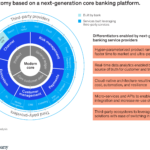Tags Artificial Intelligence Cryptocurrency Cybersecurity Digital Banking Events Payments Regulation
Stay up-to-date on all the latest FinTech news and information from around the world in the BFC FinTech Monitor.
Around the World
#Research
- The World Bank, the World Economic Forum and the Cambridge Center for Alternative Finance are launching a study on the scale of COVID-19’s impact on the fintech industry.
- According to a Ping Identity survey, good digital service is key to customer retention.
- Research conducted by Ravelin indicates that online payment fraud has become one of the most serious threats to business in the modern world.
- An IDEMIA survey has found that users in India have mostly positive attitudes about biometric technologies.
- The Financial Times has found the criminals thriving on the dark web are starting to migrate to Telegram.
#Innovations
- Banking software provider Temenos has announced the availability of next-generation core banking systems Temenos Transact and Red Hat OpenShift on the IBM Cloud. Both are expected to accelerate the adoption of hybrid cloud services in the financial industry.
- Residents of Israel will soon be able to change banks online for no fee. The procedure takes less than 7 working days.
- Huawei plans to invest USD 15 million in the Huawei Cloud Oasis program, which is aimed at accelerating the development of technology enterprises and ecosystems in the Middle East.
- PayPal is planning to launch a new version of its app that includes with savings accounts, a messenger and new online shopping tools.
- British fintech company Wise will soon allow users to invest in Apple, Amazon and Google.
- JPMorgan Chase is launching cloud-based services for its retail customers.
- The UK regulator plans to leverage blockchain to accelerate compliance.
- The United Nations Human Rights Office has called for a temporary ban on the use of artificial intelligence (AI) systems.
#Neobanking
- Western Union has entered into an agreement with open banking solutions developer Salt Edge to open a neobank in Europe.
- American financial holding JPMorgan Chase has launched a new neobank under the Chase brand.
- Monzo has introduced the Flex service, a cross between a classic credit card and a buy-now-pay-later (BNPL) solution.
#Cryptocurrencies
- The head of the European Central Bank, Christine Lagarde, called cryptocurrencies “speculative assets”, reasserting her position for the strict regulation of stablecoins.
- The Basel Committee on Banking Supervision has called for a review of its proposed stringent rules for financial institutions’ investments in cryptoassets.
- The People’s Bank of China has declared all cryptocurrency transactions illegal. In response, Crypto exchanges BitMart and Biki have already decided to stop all business in the country.
- CoinDesk expert Isaiah Douglas details why bitcoin mining is much less harmful to the environment than is commonly believed.
- Residents of El Salvador continue to protest against the legalization of bitcoin, which they believe will lead to inflation.
- Revolut will use bitcoins to pay for the opening of its branch in the United States, where it plans to start trading in shares.
- A draft regulation from the US Treasury Department will allow owners of stablecoins the possibility to freely exchange cryptoassets based on the money they are tied to.
#Central bank digital currencies (CBDCs)
- Visa’s research and product teams are working on a ‘universal payment channel’ (UPC) that enables interoperability between different digital currencies including CBDCs and private stablecoins.
- Noel Quinn, CEO of HSBC Group, discussed his bank’s work with regulators in 8 countries on CBDCs.
- Ruslan Beketayev, Minister for Economy and Financial Policy of the Eurasian Economic Commission, believes that CBDCs can be an effective tool for accelerating cross-border payments within the Eurasian Economic Union (EEU).
#Events
- The Future of Fintech Forum will take place in New York October 5–6, 2021. The main topics will be digital assets, cross-border payments with stablecoins, super apps and the future of money.
- The second annual African Digital Finance Summit will be held in Kenya February 22–24, 2022.
Russia
- The Central Bank of Russia has presented a draft of priority areas for increasing the availability of financial services through 2024. The main areas identified include the development of open APIs, a platform for the digital ruble and the creation of infrastructure for the self-registration of biometric data in the Unified Biometric System.
- Skolkovo Foundation and Dsight have compiled a rating of the most innovative Russian financial institutions, with the top 10 being Sberbank, VTB, Tinkoff, Ak Bars, Sovcombank, Raiffeisenbank, Gazprombank, Alfa-Bank, Otkrytie and Rosselkhozbank.
- DOM.RF Bank, together with the Russian regulator, have begun work on a pilot project for the digital ruble. In total, 12 financial institutions will be involved in testing it.
- Yandex has opened a financial institutions and invested USD 30 million in launching a cloud platform in Europe.
- Sberbank has launched the SberUnity platform to facilitate increased interactions between startups, venture capitalists and corporations. It is expected that, by the end of next year, there will be more than 5,000 Russian and foreign participants on the platform.
- FINOPOLIS 2021 will be held in Sochi November 10–12, 2021 and will feature large-scale panel discussions as well as several sessions and roundtables dedicated to various fintech topics.
- Sberbank has invested RUB 2 billion into AI-powered debt collection solutions. Tinkoff Bank is also planning its own use of AI-based solutions, especially for combatting fraud.
Ukraine
- The Ministry of Finance will start paying salaries to its employees in digital hryvnia by the end of the year. The Ministry is eyeing a full-fledged introduction of the digital hryvnia in the country by the end of 2022.
- Monobank is preparing virtual terminals and has already started testing its first ATMs.
- Analysts of the National Bank of Ukraine have outlined the risks cryptocurrencies pose to the hryvnia in its Monetary Policy for 2022. At the same time, the Policy also recognizes the importance of technological innovations related to virtual assets and sees “a number of promising opportunities” associated with them.
Belarus
- Mikhail Demidenko, head of Research and Strategic Development at the National Bank of Belarus, discusses the introduction of the digital Belarusian ruble.
Kazakhstan
- A project to establish the digital tenge has only managed to bring 3 financial institutions on board so far. Sources purportedly close to the project have revealed that the regulator is still discussing the main technical characteristics of the digital tenge project and that the issuance of the CBDC within the public will be no earlier than 2023.
- So far this year, the share of cash withdrawals from the total turnover of cards has decreased from 36.9% to 24.1%, indicating an active move toward non-cash payments.
Kyrgyzstan
- Kyrgyzstan is studying the benefits and risks of a potential electronic catfish project that is backed by gold from the country’s deposits.
- Two members of Parliament discuss a new draft law on the regulation of fintech in the country in a two-part article for the newspaper Vecherniy Bishkek. Check them out here and here.
- Visa and Halyk Bank Kyrgyzstan have launched a tap-to-phone solution for accepting payments from a smartphone.
- The number of payment cards in Kyrgyzstan has increased 15%.
Uzbekistan
- UZCARD has signed cooperation agreements with two Russian companies (Innopolis and Innotech) within the framework of implementing fintech, big data and AI solutions as well as the development of a venture and innovation ecosystem.
- Asakabank has launched a new global payment innovation service that provides companies with the ability to track international transactions.
Azerbaijan
- Visa and Expressbank are launching the Visa B2B Connect payment service for business clients in Azerbaijan. The service will allow faster, safer and lower-cost international transfers.
- The turnover of payment cards in Azerbaijan has increased by more than 20%.
Armenia
- Hidden cryptominers only attacked the computers of 0.73% of Armenian users in the second quarter of 2021.
Georgia
- TBC Bank has launched qualified electronic signatures and seals for business clients.
- Spanish technology company Making Science has announced the acquisition of Sweeft Digital, an e-commerce payment solutions software company.
 BFC Bulletins Monthly News Digest
BFC Bulletins Monthly News Digest




